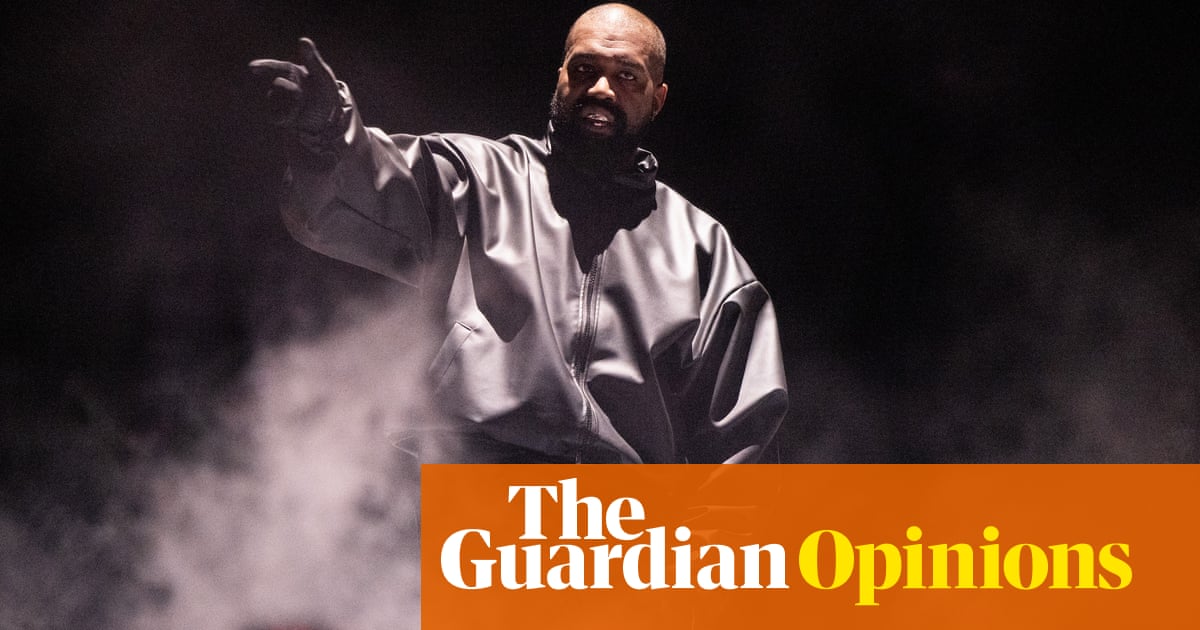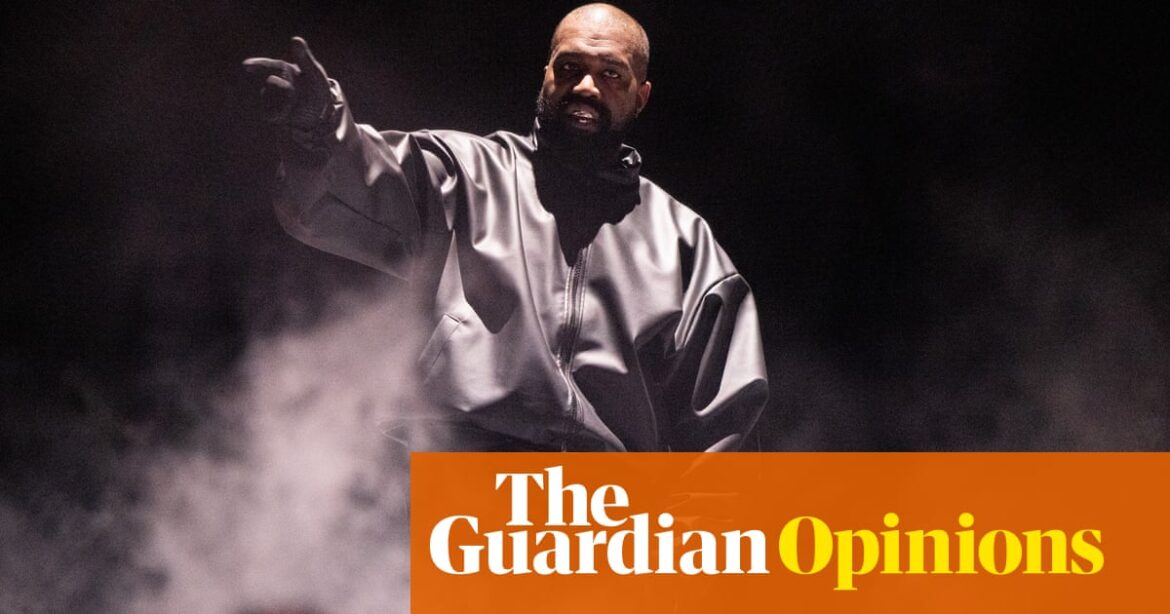
Over the course of about a month in late 2022, Kanye West seemingly blew up his career for ever. Weeks of increasingly erratic behaviour culminated in a slip into full-blown reactionary populism with a series of offensive stunts, including but not limited to: wearing a White Lives Matter T-shirt, reviving hoary antisemitic tropes about Jews controlling the media, and threatening on X (then Twitter) to go “death con 3” on Jews.
Within weeks, West’s record label and publisher – Universal Music Group and Sony Music Publishing, respectively – terminated their contracts with him; he was dropped by his agency, CAA; and Adidas, Balenciaga and Gap canned their continuing collaborations. The vast majority of his $2bn (£1.6bn) net worth evaporated overnight. Kanye Is Never Coming Back From This read the headline of one Rolling Stone article at the time.
Less than two years later, the opposite is true: West’s latest album, a collaboration with the singer Ty Dolla $ign called Vultures 1, hit No 1 on the US Billboard 200 album chart and No 2 on the British charts. Its lead single, the Playboi Carti and Rich the Kid collaboration Carnival, reached No 1 on the Billboard Hot 100. He also recently headlined Rolling Loud Los Angeles – the rap world’s equivalent to Coachella – with Dolla $ign, despite reports that his agent was struggling to find venues willing to host him.
West’s career has always been defined by its peaks and troughs: he entered a period of self-exile in 2010, after receiving backlash for interrupting Taylor Swift at the 2009 MTV Video Music Awards, only to return with his lauded career high My Beautiful Dark Twisted Fantasy that November. But his more recent descent into troubled waters did feel like a marked shift away from erratic provocation into fringe conspiracy.
A large part of West’s celebrity for the past decade has been his sheer omnipresence: his music was everywhere, but so was his multibillion-dollar sneaker line; his collaborations with high-fashion labels and high-street brands alike informed the taste of millions. When he married Kim Kardashian, de facto leader of the world’s most famous family, in 2014, he expanded his reach even further. Without the backing of any of the blue-chip brands that elevated him to that status, it seemed likely that West’s hold on culture would be loosened, at least a little.
So why is the inverse true? West’s resurgence confirms what a lot of people in the entertainment industries have known for a long time: the general public doesn’t really care about an artist’s misdeeds if the art is still passable, no matter how unrepentant they might be. Artists such as Michael Jackson and R Kelly, for example, are still in high rotation on radio stations and hugely popular on streaming services. MJ, a new musical sanctioned by Jackson’s estate that’s currently playing in London’s West End, is a commercial success – suggesting that audiences aren’t exactly wringing their hands over celebrating the singer’s legacy.
This is doubly true for younger generations: Lil Uzi Vert and Playboi Carti, two of gen Z’s most adored rap stars, have been accused of domestic assault and faced next to no backlash. TikTok virality is heavily driving West’s Carnival, and it seems likely that those coming to the track from that service don’t really care about West’s past comments – or potentially even know anything about West, or at least his past behaviour, given how easily TikTok and streaming services decontextualise music for their listeners.
For many, music is an escapist pursuit, meaning that questions of ethics around listening to someone who might not share your values – and thereby lining their pockets – don’t really come into the equation. West has also historically been deeply sceptical of the way the largely white entertainment industry sets up black entertainers for failure; I wouldn’t be surprised if this aspect of his music and celebrity has also created something of a buffer against any backlash or attempted cancellations.
Benefiting West is a culture in which rightwing, self-appointed “free thinkers” such as Andrew Tate and Jordan Peterson are already hugely popular among young men, who also make up the core of West’s fanbase. West is not necessarily as much of an outlier in public discourse as he may be perceived: his rightward shift seems fairly in line with a broader cultural movement towards conservatism. Last year, songs by Jason Aldean and Oliver Anthony that alluded to rightwing and QAnon talking points, respectively, hit No 1 on the Billboard charts.
The industries that initially dropped West, too, are extremely fickle when there’s good money to be made. Although West still doesn’t have a label or publisher, he does have the wholehearted support of major streaming services such as Spotify and Apple Music, which have each put songs from Vultures 1 on popular editorial playlists such as RapCaviar, Spotify’s flagship rap playlist. Adidas is still selling Yeezy-branded shoes; it has donated a portion of proceeds to anti-hate groups, which means that it is also keeping a portion of the proceeds. The announcement it would resume selling Yeezy shoes also resulted in a tidy bump in its share price.
It’s not hugely surprising that a festival such as Rolling Loud would choose to swiftly book West after his chart success; when companies sever ties with their clients over alleged misdeeds, they’re responding to the cultural temperature to insure themselves against potential backlash from consumers. Rolling Loud saw its audience was back on West’s side – if, in fact, it had ever really left – and acted accordingly.
It’s hard to say where this leaves West’s comeback: for now, at least, venues still seem resistant to his booking, although it’s not hard to see some kind of haphazard festival tour on the cards. If Vultures 2 and Vultures 3, his other two planned albums for the year, are even half as successful as Vultures 1, it will be hard for the broader music and entertainment industries to treat him as a pariah for much longer. The public have already voted with their wallets.
-
Shaad D’Souza is a freelance culture journalist
-
Do you have an opinion on the issues raised in this article? If you would like to submit a response of up to 300 words by email to be considered for publication in our letters section, please click here.
Source: theguardian.com



